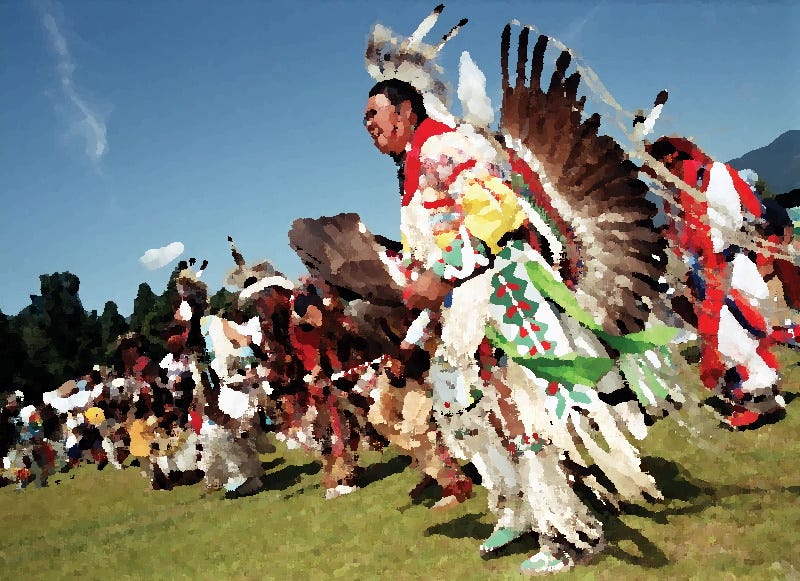If Only Native Americans Had The Aptitude...
Thanksgiving is the day when the story is told of how indigenous people saved the pilgrims in the beginning of the 17th century, which continuously feeds the urge for mandated political correctness. It's that feel-good event that elevates an ethnic group with virtually no claim to fame, while many of the details are glossed over or ignored completely for the sake of diversity and inclusion, a practice that people have reluctantly endured in contemporary Western civilization. The underlying wink-wink of the story is that without Native Americans, Western civilization would have been doomed in the New World.
While "more than half of the English settlers died during that first winter," history doesn't quite paint the Wampanoag people as descendants of Superman, according to history.com.
The native inhabitants of the region around Plymouth Colony were the various tribes of the Wampanoag people, who had lived there for some 10,000 years before the Europeans arrived. Soon after the Pilgrims built their settlement, they came into contact with Tisquantum, or Squanto, an English-speaking Native American. Squanto was a member of the Pawtuxet tribe (from present-day Massachusetts and Rhode Island) who had been seized by the explorer John Smith’s men in 1614-15. Meant for slavery, he somehow managed to escape to England, and returned to his native land to find most of his tribe had died of plague. In addition to interpreting and mediating between the colonial leaders and Native American chiefs (including Massasoit, chief of the Pokanoket), Squanto taught the Pilgrims how to plant corn, which became an important crop, as well as where to fish and hunt beaver. In the fall of 1621, the Pilgrims famously shared a harvest feast with the Pokanokets; the meal is now considered the basis for the first Thanksgiving holiday.
The historical record must be read with a sprinkle of critical thinking—some historians have a penchant for embellishment—and an example of a curious note is the teaching of "where to fish," as if pilgrims couldn't figure that out, having been at sea for over two months and then settled by the Atlantic coast. And why teach how to hunt beaver and not wild turkey? And why not beaver for Thanksgiving?
But what is left out is the broader point that, unlike other civilizations, the footprints of Western Europeans are found all over the world, and despite numerous setbacks, nothing stopped the colonizers from invading every square inch of real estate that they encountered. Conquest was the hobby of the day and the graphic below delivers the perspective that has been buried: How did a geographically concentrated small group of people do it?
Yes, the claims that America is stolen land are correct, but the question that lingers and nobody asks is "Who owned the land before Native Americans arrived?" Did they conquer the land from somebody else? Here's a twist to the claim as reported by The Independent, which invalidates the demand for compensation, your honor.
New archaeological evidence suggests that America was first discovered by Stone Age people from Europe—10,000 years before the Siberian-originating ancestors of the American Indians set foot in the New World.
Obviously Native Americans—over 500 tribes—eventually designated what and where sacred land was, in line with similar logic by other civilizations because that's how humans behave by default. But the land wasn't theirs, was it? Inconvenient information is always ignored, especially when one is heavily committed to a narrative. The push for silly objections to evolution continue to fester, especially within academia, and "Decolonizing Thanksgiving: A Toolkit for Combatting Racism in Schools" is one those gems.
Stereotypical and racist portrayals of Native peoples fill U.S. elementary schools each November as students encounter historically-inaccurate portrayals of Native peoples in arts & crafts, books and lessons about a shared Thanksgiving meal, and songs and plays with hand-crafted headdresses and vests.
Although the author, Lindsey Passenger Wieck, has valid points, most of the piece is predictably hollow and logically circular, and misses the glaring truth that must be highlighted. Native American culture is often invoked as a magic emotional potion, which is always an indication that there's not much to offer beyond colorful costumes, rituals, dances and decorative paint patterns.
Let's bring clarity to the topic. I have driven thousands of miles through 33 US states and am very familiar with the territory. One must pause, take a step back in time and realize that colonizers only saw a vast wasteland without legal deeds and with plenty of opportunity. Considering that Europeans traveled over 3,000 miles by sea in ships built with ingenuity and technology that was mesmerizing to Native Americans, the outlook on civilization was extremely different. Although stone structures existed in the New World, pilgrims had seen the construction of castles, cathedrals and palaces that would have left Native Americans speechless. And then there were weapons, and thanks to the Spanish, Native Americans had already found a new mode of transportation—the horse.
Here's the simple question: What would America look like if European colonizers had never set foot on the continent? Can anyone envision New York City existing in its present form without Western civilization? Based on historical and contemporary socio-techno-economic measurements and observations, the previously mentioned vast wasteland would have remained virtually unchanged and unproductive to this day—and that cannot be disputed.
The broad suggestion is that without the invasion and the genocide, which was wrong, history would have been rewritten and Native Americans would have succeeded on their own beyond anyone's wildest dreams. No, not really! In short, everyone wants a slice of the pie after it has been baked, because they've always lacked baking skills, but still pretend that they can bake but can't quite understand the recipe.
If only Native Americans had the aptitude to defend, to expel, to invent and innovate, and to build advanced societies, Western Europeans wouldn't be here. The truth is often hard to digest, but it's still the truth!




